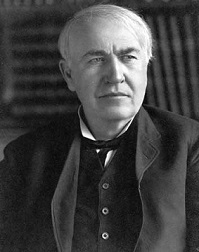 |
| Edison during his later years (http://www.britannica.com/biography/Thomas-Edison ()) |
Thomas Edison once said, "I have not failed. I've just
found 10,000 ways that won't work"("Thomas A. Edison Quotes.").
Edison created the world's first practical light bulb, and remarked this
statement when a reporter expressed sympathy regarding his numerous failures.
Thomas Edison was an extraordinary inventor, having over 1,000 patents to his
name. He was born on February 11, 1847 in Milan, Ohio to Samuel and Nancy
Edison. Thomas began as a telegraph operator before becoming an inventor,
forever changing life around the world. His work includes the phonograph,
motion picture camera, and most famously the light bulb. Although many had
attempted creating a sustainable light bulb and failed, Edison believed he had
the answer to solving the problem. A true hero displays courage when faced with
obstacles, by always finding a way and doing what's necessary to overcome them.
Thomas Edison invented many devices that had a profound impact on the world;
however, his perseverance, intelligence, and dedication serves as an
inspiration to the hero he became.
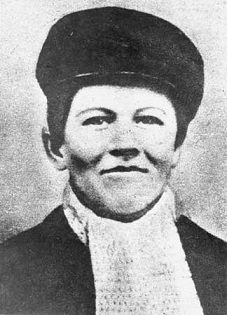 |
| Thomas Edison as a young boy (http://www.britannica.com/biography/Thomas-Edison ()) |
Throughout his life, Edison was never discouraged and
persevered through near-impossible situations, believing they could only help
him in his search for success. Despite being seen as a genius for his great
contributions to the world: "His teacher, failing to relate to the way
Edison's mind worked, dismissed him as being 'addled,' or
retarded"("Thomas Alva Edison." Scientists). Thomas was
believed to be dyslexic, but that did not stop from being to read a single book
yet alone a whole library. His love for reading was proven to be quite useful,
offering him much insight in his endeavors. His personal struggles as a
child did not stop there, as Edison had begun to lose his hearing and was
nearly deaf by the time he died: "It was on one of the early train runs
that a famous event occurred that affected Edison's future life. While Edison
was running to catch the train, one of the conductors reached down, grabbed him
by the ears, and pulled him aboard. Edison later reported that he felt
something snapped inside his head..." ("Thomas Alva Edison." World).
Thomas believed his deafness contributed to his later success, helping
concentrate during intense moments, by blocking all the noise around him.
Ironically, Thomas developed much of the entertainment industry despite his
lack of hearing. Edison's first invention, the electric vote
recorder was seen as a failure and a major setback or so it was thought:
"He received his first patent on an electric vote recorder, a device
intended for use by elected bodies such as Congress to speed the voting
process. This invention was a commercial failure" (United States National
Park Service). Many have told him that he was wasting his time but Thomas had
just begun to grasp the inevitable connection between success and failure. This
little setback left Edison with a feeling of self-improvement pushing him
further in creating products that would revolutionized the world. Thomas
Edison failed numerous times in his life; however he nearly always found a way
to achieve success, and some would argue, he never failed at all.
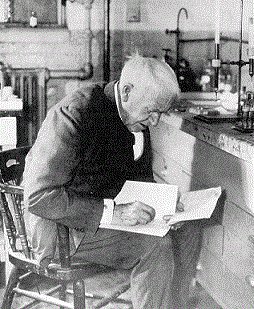 |
| One of the many instances where Edison read a book (http://www.twu.edu/dsc/alva_edisonI.htm ()) |
Thomas Edison possessed an incredible intelligence,
creating numerous inventions, leading to the birth of three major industries
worldwide and giving him the title as one of the greatest inventors of all
time. After being deemed as "addled", his mother decided to
home school him, embarking him on his long journey: "Nancy Edison
introduced her son to natural philosophy, a mixture of physics, chemistry, and
other sciences, among other subjects. Before long, Tom became fascinated with
chemistry in particular and built a chemical laboratory in a corner of the
cellar. By the age of 10, he was conducting various original experiments in his
home" ("Thomas Alva Edison." Scientists). Edison's lack
of schooling forced him to be educated by his mother in numerous fields of
study. He was self-educated and had to work independently to succeed. As Thomas
Edison's knowledge began to grow, his inventions became more sophisticated:
"Edison's active nature and inquisitive mind led him to wander from
subject to subject. In some cases, he stayed with a project long enough to see
it to commercial production" ("Thomas Alva Edison." World).
Edison possessed an insatiable curiosity for all of his life, allowing him to
create numerous inventions in different fields of study that would help succeed
in creating a brighter future for everyone. One of these inventions was the
famous light bulb: "Edison spent five years trying to come up with a safe,
inexpensive electric light that would replace the gaslight. In September 1882
he turned on the lights to the world's first permanent, commercial central power
system, located in lower Manhattan" ("Thomas Alva Edison." Science).
He used a cotton thread to act as the filament allowing for the first
commercially viable light bulb to be created. The light bulb led to the birth
of electric power industry supplying electricity to the public. Thomas Edison's
remarkable intelligence, without a doubt, is responsible for his inspirational
achievements.
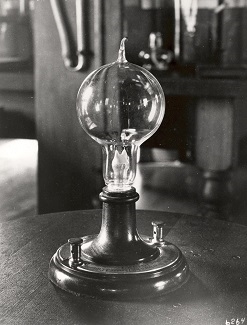 |
| One of the first light bulbs Edison made (http://www.edisonmuckers.org/thomas-edison-lightbu ()) |
Edison's work ethic and dedication was paramount in
producing his inventions, ones that would forever change mankind and usher in
the modern world. Thomas was no ordinary man; taking every step in order to
ensure he created a product that everyone would want: "One of the lifelong
habits he developed during this period was working long hours with only short
naps to keep him going. Later in life it was not unusual for Edison to spend
twenty out of every twenty-four hours at work" ("Thomas Alva
Edison." Scientist). Thomas Edison slept a mere four hours every
day, regarding sleep as a waste of time. His line of work was quite intense;
however Edison would work all night while others were asleep. Once he was done
with his project, he was ready to move on to the next. Thomas applied his
philosophy during his work with the light bulb: "He was, for the most
part, a trial-and-error inventor. At the time of his search for a lamp
filament, he is said to have tried successively some six thousand kinds of
vegetable fibers" ("Thomas Alva Edison." Dictionary). Once he
received an idea would not stop until it was fully completed. Edison felt it
was his duty to perfect his work. Some of his projects spanned for many years
requiring a lot of work: "Edison unveiled his first phonograph in 1877,
but it took 10 years for it to become a commercial success"("Thomas
Alva Edison." Science). Edison spent 10 years perfecting the
phonograph, providing everything needed to make it work. His hard work not only
made it a success but marked the beginning of the sound industry. Edison
inspired those around through his infinite capacity for hard work.
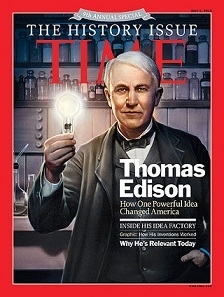 |
| Thomas Edison on the cover of Time Magazine (http://content.time.com/time/covers/0,16641,201007 ()) |
Thomas Alva Edison displayed heroism, not only from his accomplishments, but from his perseverance, intellect, and hard work. His methods inspire scientists and inventors today and will continue to do so, till the end of time. He operated on principles given to him when he was young and ones that aided him on his journey of innovation. Thomas stated, "Many of life's failures are people who did not realize how close they were to success when they gave up" ("Thomas A. Edison Quotes). Edison's success was a result of his desire to learn more and never accepting failure. His inventions virtually define the standard of the modern world. Edison was awarded with numerous awards and accolades for his lifelong achievements. Thomas Edison serves as a bright light in a world where creativity and innovation are vital to creating a better world.
Work
Cited
"Thomas A. Edison Quotes." Thomas A. Edison
Quotes (Author of Diary and Sundry
Observations
of Thomas Alva Edison). N.p., n.d. Web. 13
May 2016.
"Thomas Alva Edison." Dictionary
of American Biography. New York: Charles Scribner's Sons,
1944.Biography in Context. Web. 4
May 2016.
"Thomas Alva Edison." Science
and Its Times. Ed. Neil Schlager and Josh Lauer. Vol. 5. Detroit:
Gale, 2000. Biography in Context.
Web. 4 May 2016.
"Thomas Alva Edison." Scientists:
Their Lives and Works. Detroit: UXL, 2006. Biography in
Context. Web. 29 Apr. 2016.
"Thomas Alva
Edison." World of Physics. Gale, 2006. Biography in Context.
Web. 27 Apr.
2016.
United States National Park Service. "Edison Biography."National
Parks Service. U.S.
Department of the Interior, n.d. Web. 02 May 2016.
Page created on 5/22/2016 12:00:00 AM
Last edited 5/22/2016 12:00:00 AM
